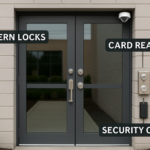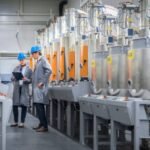Efficiency is crucial for lowering energy costs and extending the life of your AC system. Fortunately, you can improve your system’s efficiency in many ways, from changing the air filters to upgrading to a new model.
Other simple steps include preventing airflow obstructions and using ceiling fans. Additionally, you can minimize the workload of your AC by cooking and washing during the better parts of the day.
Install Smart Sensors
In addition to optimizing energy usage, the use of intelligent sensors helps reduce HVAC operational costs. These powerful devices collect real-time data and provide valuable insights into building performance.
With this information, occupant comfort preferences can be stored and recalled, which allows the system to adapt to the individual’s settings. Moreover, occupancy sensors enable HVAC systems to detect human presence and adjust temperature settings accordingly, eliminating the need for manual adjustments.
Smart sensors also enable zoning functionality, allowing different areas to be independently regulated based on occupancy levels. It ensures energy is not wasted in unoccupied spaces and maintains optimal temperatures for occupied areas.
Additionally, smart sensors can detect equipment faults and inefficiencies, which allow for proactive maintenance. Reducing downtime and extending the lifespan of HVAC equipment can be achieved through proper maintenance and timely AC repair. It also enables the intelligent utilization of renewable energy sources such as solar and geothermal. It further reduces reliance on non-renewable energy sources and enhances sustainability.
Schedule Regular Maintenance
A well-known saying states, “Prevention is better than cure.” It emphasizes the importance of taking necessary precautions to avoid problems before they arise, which is always a smart move. Scheduling regular maintenance keeps your AC system working efficiently throughout the summer. It improves energy efficiency, reduces cooling costs, prevents unnecessary breakdowns, and extends the lifespan of your equipment.
During scheduled inspections and tune-ups, technicians carefully examine each component of the AC system to identify any signs of wear and tear or potential issues. Minor problems like refrigerant leaks and a malfunctioning thermostat can be detected and corrected in infancy, preventing them from escalating into costly air conditioning repair or replacements.
Routine AC maintenance also keeps the evaporator and condenser coils clean, reducing indoor air quality pollutants, pollen, mold, pet dander, and more. It creates a healthy, comfortable living or working environment and enhances your property’s resale value. Investing in AC maintenance is the best way to ensure optimal AC system performance and protect your home or commercial space.
Keep the Airflow Open
Optimal airflow is critical for an AC system to function effectively. It facilitates filtration and cleaning, preventing the buildup of contaminants and allergens in your home or office. It also reduces strain on the compressor, reducing energy costs and increasing lifespan.
If your air conditioning system’s filter gets clogged or dirty, it can limit airflow, causing your AC to work too hard. To avoid this issue, cleaning or replacing the filter regularly is essential. Keep furniture and rugs away from air vents to avoid blocking the airflow. Leaky ducts can also cause problems, as they can allow up to 30% of cool air to escape. Higher energy bills and decreased cooling performance may occur due to this. Having your ductwork professionally sealed will help improve efficiency. Similarly, installing a programmable thermostat allows you to increase or decrease your temperature settings based on your schedule, helping to conserve energy during peak hours and reducing the strain on the electrical grid. It helps prevent brownouts or blackouts and ensures your system operates as efficiently as possible all year round.
Upgrade to a More Energy-Efficient Model
Air conditioning systems consume significant energy in a typical home, even more during the summer. Consider upgrading your current system to a more efficient model to minimize energy usage.
Look for equipment with high Seasonal Energy Efficiency Ratio ratings and programmable thermostats that allow you to customize settings based on occupancy. These solutions reduce duct leakage and improve air quality for a more comfortable indoor environment.
Efficiency improvements have a lateral effect; saving energy in one area frees up resources to apply elsewhere. Achieving efficiency gains throughout your home can significantly reduce energy costs and environmental impact.










